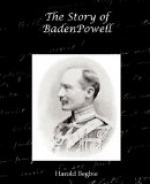The end of it was that Wedza’s warriors were completely bluffed by the resourceful B.-P.; they were driven out of their stronghold, and the stronghold itself blown into smithereens. During this attack Baden-Powell narrowly escaped death, a small party he was with being fired upon at close range by a number of the enemy hidden behind a ridge of rocks. “My hat,” says B.-P., “was violently struck from my head as if with a stick.”
This reminds me of the service rendered by Baden-Powell as a doctor. “Three times in this campaign have I taken out to the field with me a few bandages and dressings in my holster, and on each occasion I have found full use for them.” Once he doctored some Matabele women and children who had been hit by stray bullets while lying in the long grass. On this occasion he invented what he calls a perfect form of field syringe: “Take an ordinary native girl, tell her to go and get some lukewarm water, and don’t give her anything to get it in. She will go to the stream, kneel, and fill her mouth, and so bring the water; by the time she is back the water is lukewarm. You then tell her to squirt it as you direct into the wound, while you prize around with a feather.”
After the breaking of Wedza there was work to be done in Mashonaland, and then, when the rebellion had been crushed and the colonist was able to search fearlessly among the charred beams of his homestead ere setting about building anew, the gallant Baden-Powell turned his face towards Old England. Before leaving South Africa, however, he spent the Christmas Day of that memorable 1896 in Port Elizabeth. “After breakfast,” he writes in his diary, “to church. Everything exactly ordered as if at home: the Christmas Day choral service with a good choir and a fine organ. And as the anthem of peace and goodwill rolled forth, it brought home to one the fact that a year of strife in savage wilds had now been weathered to a peaceful close.”




